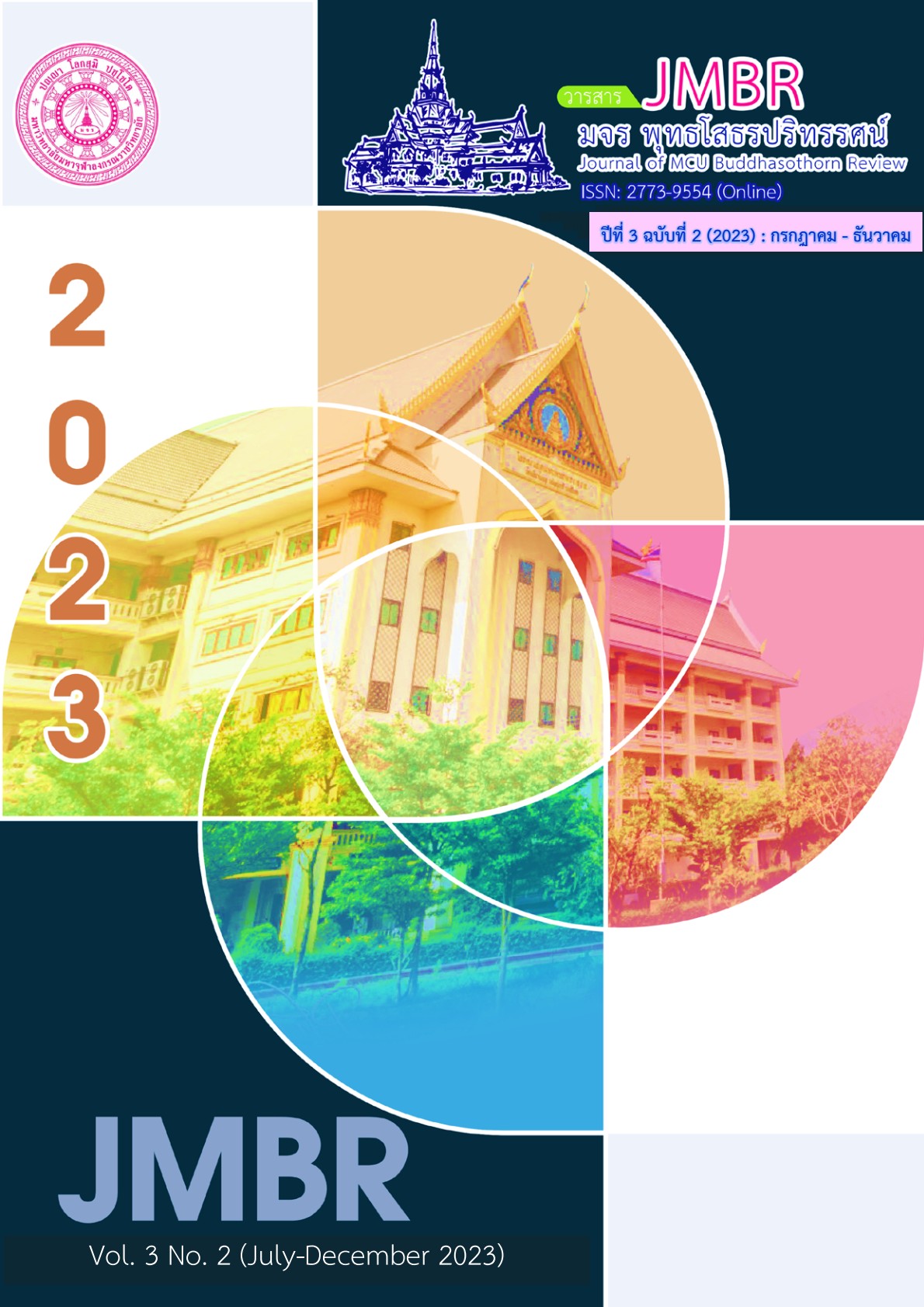Application of the Sufficiency Economy Philosophy in the Daily Life of Monks and Novices, a Case Study of Wat Pitulathirat Rangsarit, Chachoengsao Province
Main Article Content
Abstract
The objectives in this study were to study the application of the Sufficiency Economy Philosophy in daily life and suggestions regarding the application of the Sufficiency Economy Philosophy in the daily life of monks and novices at Wat Pitulathirat Rangsarit in Chachoengsao Province. The population used in this study were the total number of 40 monks and novices at Wat Pitulathirat Rangsarit in Chachoengsao Province. The tool used in the study was a questionnaire with 5-rank rating scale (Rating Scale). The reliability of the entire questionnaire was 0.916. The data was analyzed by using a statistical package. The used statistics in data analysis are frequency, percentage, and mean and standard deviation. The results of the study found that:
1. Application of the Sufficiency Economy Philosophy in the daily life of monks and novices at Wat Pitulathirat Rangsarit in Chachoengsao Province, in overall, it was found that it was at a high level. When have been considered in each aspect, there were on the receiving information about the Sufficiency Economy Philosophy, on the expense reduction and the consuming and conservation of the natural resources and it was at a high level. As for saving was at a moderate level.
2. Suggestions regarding the application of the Sufficiency Economy Philosophy in daily life were found that there should be a recycling bin, consuming the water from the temple's water plant to increase savings. The temple should organize activities to promote the continuous application of the Sufficiency Economy Philosophy as well as giving the good advice to the congregation regarding the application of the Sufficiency Economy Philosophy Combined with the principles of Sappurisadhamma 7, that is, the Dhamma makes one a good person or the qualities of a good person.
Article Details

This work is licensed under a Creative Commons Attribution-NonCommercial-NoDerivatives 4.0 International License.
ต้นฉบับที่ได้รับการตีพิมพ์ในวารสาร มจร พุทธโสธรปริทรรศน์ วิทยาลัยสงฆ์พุทธโสธร มหาวิทยาลัยมหาจุฬาลงกรณราชวิทยาลัย ถือเป็นกรรมสิทธิ์ของวิทยาลัยสงฆ์พุทธโสธร มหาวิทยาลัยมหาจุฬาลงกรณราชวิทยาลัย ห้ามนำข้อความทั้งหมดหรือบางส่วนไปพิมพ์ซ้ำ เว้นเสีย แต่ว่าจะได้รับอนุญาตจากวิทยาลัยฯ เป็นลายลักษณ์อักษร และเพื่อให้เป็นไปตามกฎหมายลิขสิทธิ์ ผู้เขียนทุกท่านต้องลงลายมือชื่อในแบบฟอร์มใบมอบลิขสิทธิ์ บทความให้แก่วารสาร พร้อมกับบทความต้นฉบับที่ได้แก้ไขครั้งสุดท้าย นอกจากนี้ ผู้เขียนทุกท่านต้องยืนยันว่าบทความต้นฉบับที่ส่งมาตีพิมพ์นั้น ได้ส่งมาตีพิมพ์เฉพาะในวารสาร มจร พุทธโสธรปริทรรศน์ เพียงแห่งเดียวเท่านั้น
References
เกศสุดา โภคานิตย์ และกีฬา หนูยศ. (2559). การประยุกต์ใช้ปรัชญาเศรษฐกิจพอเพียงในการบริหารกองทุนหมู่บ้าน ตำบลบ้านขาม อำเภอจัตุรัส จังหวัดชัยภูมิ. วารสารบัณฑิตวิทยาลัย พิชญทรรศน์, 13(2): 11-18.
น้ำฝน ผ่องสุวรรณ. (2553). ปัจจัยที่มีอิทธิพลต่อความสำเร็จของการประยุกต์ปรัชญาเศรษฐกิจพอเพียงในจังหวัดสมุทรสงคราม (วิทยานิพนธ์เศรษฐศาสตรมหาบัณฑิต สาขาวิชาเศรษฐศาสตร์ธุรกิจ). บัณฑิตวิทยาลัย, มหาวิทยาลัยรามคำแหง
ปริศนา โลมากุล. (2560). การประยุกต์ใช้แนวคิดเศรษฐกิจพอเพียงในชีวิตประจำวันของประชาชนในอำเภอศรีราชา จังหวัดชลบุรี (วิทยานิพนธ์บริหารธุรกิจมหาบัณฑิต สาขาวิชาการจัดการสาธารณะ). วิทยาลัยพาณิชยศาสตร์: มหาวิทยาลัยบูรพา.
ภูสิทธิ์ ขันติกุล. (2555). การประยุกต์ใช้ปรัชญาเศรษฐกิจพอเพียงในระดับบุคคลและครัวเรือนของประชาชนในเขตดุสิต กรุงเทพมหานคร (รายงานการวิจัย). กรุงเทพฯ: มหาวิทยาลัยราชภัฏสวนสุนันทา.
มนูญ มุกข์ประดิษฐ์. (2547). การศึกษาวิเคราะห์ปรัชญาเศรษฐกิจพอเพียงอันเนื่องมาจากพระราชดำริกับหลักธรรมในพระพุทธศาสนา (วิทยานิพนธ์พุทธศาสตรดุษฎีบัณฑิต สาขาพระพุทธศาสนา). บัณฑิตวิทยาลัย: มหาวิทยาลัยมหาจุฬาลงกรณราชวิทยาลัย.
มูลนิธิชัยพัฒนา. (2550). เศรษฐกิจพอเพียงและทฤษฎีใหม่. กรุงเทพฯ: สำนักงานมูลนิธิชัยพัฒนา.
ศูนย์ศึกษาเศรษฐกิจพอเพียง สถาบันบัณฑิตพัฒนาบริหารศาสตร์. (2554). ปรัชญาของเศรษฐกิจพอเพียงกับสังคมไทย. กรุงเทพฯ: สถาบันบัณฑิตพัฒนาบริหารศาสตร์.
อุทัย ศิริภักดิ์ และภูริทัต ศรีอร่าม, (2555). การศึกษาบทบาทของพระสงฆ์ในการส่งเสริมปรัชญาเศรษฐกิจพอเพียงแก่ประชาชน (รายงานการวิจัย). สถาบันวิจัยพุทธศาสตร์: มหาวิทยาลัยมหาจุฬาลงกรณราช วิทยาลัย.


